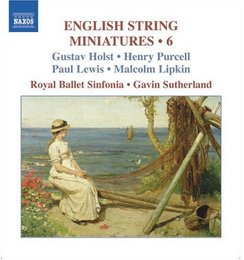| All Artists: Gustav Holst, Henry Purcell, Paul [Composer] Lewis, Adam Carse, Peter Warlock, Paul Carr, William Lloyd Webber, Lionel Sainsbury, Malcolm Lipkin, Gavin Sutherland, Royal Ballet Sinfonia Title: English String Miniatures, Vol. 6 - Holst, Warlock, etc. Members Wishing: 0 Total Copies: 0 Label: Naxos Original Release Date: 1/1/2006 Re-Release Date: 9/26/2006 Genres: Special Interest, Classical Styles: Marches, Opera & Classical Vocal, Chamber Music, Forms & Genres, Theatrical, Incidental & Program Music, Historical Periods, Baroque (c.1600-1750), Classical (c.1770-1830) Number of Discs: 1 SwapaCD Credits: 1 UPC: 747313275328 |
Search - Gustav Holst, Henry Purcell, Paul [Composer] Lewis :: English String Miniatures, Vol. 6 - Holst, Warlock, etc.
 | Gustav Holst, Henry Purcell, Paul [Composer] Lewis English String Miniatures, Vol. 6 - Holst, Warlock, etc. Genres: Special Interest, Classical
|
Larger Image |
CD Details |
CD ReviewsYet More Wonderful English String Orchestra Music J Scott Morrison | Middlebury VT, USA | 09/26/2006 (5 out of 5 stars) "In a review of a previous issue in this ongoing series of releases from Naxos of 'English String Miniatures' -- this one is Vol. 6 -- I wrote, "If there was ever any doubt that the English have been masters of writing for the string orchestra, there shouldn't be any now." I can't think of another nation's composers who have done so much for the genre.
In this CD we get music of Holst, Purcell, Peter Warlock, William Lloyd Webber, Paul Lewis (b.1943), Adam Carse (1878-1958), Paul Carr (b.1961), Lionel Sainsbury (b.1958) and Malcolm Lipkin (b.1932). And a wonderful lot it is. Probably the most familiar work here is Purcell's 'Chacony in G Minor' in its arrangement for strings by Benjamin Britten. It is essentially a passacaglia on an interesting and relatively complex ground bass. Why oh why don't we more often hear this one in place of the ubiquitous (misnamed) Canon of Pachelbel? The Royal Ballet Sinfonia (of Birmingham) under Gavin Sutherland play with crisp, clean articulation combined with suavely lush string sound, as in all the other works presented here. Lovely. Holst is represented by his 'A Moorside Suite', a three-movement work arranged by Philip Lane (who also arranged Warlock's 'Bethlehem Down.') It is typical modal Holst with catchy rhythms and tunes. Adam Carse is best known for his pedagogical works for young string players but his 'Winton Suite' is for grown-ups. It is a collection of five pieces -- Prelude, Air, Dance, Song, Finale -- which are in a modernized baroque style. 'Song', a kind of concertante for violin, cello and strings, is utterly lovely. Warlock's Christmas carol, 'Bethlehem Down' (1927) is presented here in Philip Lane's more or less straight arrangement. Lovely legato playing throughout; this Royal Ballet Sinfonia is good! Carr has primarily been a composer for television. His 'A Very English Music' (2002), a 'paean to the English countryside' has three movements: Cuckmere Haven, Cornish Air, and The Hunt Gathering. The latter portrays a Yorkshire Boxing Day hunt 'with supporters, protesters, huntsmen and maybe even the old fox.' There couldn't be a more contemporary comment on English country life than that! William Lloyd Webber, probably best known for his two musical sons, was primarily a composer of church music but he also wrote a fair amount of concert music. His 'Waltz in E Minor' (1939) is a graceful four-minute work that conjures up dancers in formal attire gliding across the floor. Not Viennese, not rustic -- very sophisticated harmonies, much use of divisi strings, and a slightly melancholic undertone. Sainsbury's 'Two Nocturnes' (1990) are darkly dramatic, the first anguished chromaticism, the second tentative lyricism. Lipkin's 'From Across La Manche' is three movements and uses a somewhat astringent harmonic language. 'Overture' is jaunty and forcefully rhythmic. 'Ballade' is introspective, hushed but reaching a climax before falling back into a musing mood. 'Dance-finale' takes a measure from Vivaldi's 'Four Seasons' (which I would not have recognized except for its being pointed out in the excellent notes by Philip Lane) that happens to have a mazurka rhythm and Lipkin uses it as the guiding principle of the entire piece. Once again, as in Volume 5 of this series, Sutherland and his Birmingham group prove themselves excellent proponents of this so-very-English string music. Recommended. Scott Morrison " |

 Track Listings (20) - Disc #1
Track Listings (20) - Disc #1